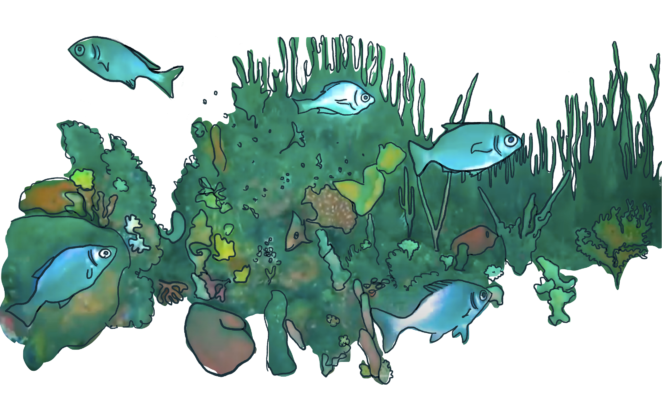learning pathway on: Ocean, ocean knowledge and human rights

Learning about the ocean and sharing ocean knowledge is increasingly recognized as essential to contribute to the protection of human rights. As the UN Environment Programme summarized, the ocean:
- “The ocean is our support system”, as it produces ocean and contributes to the water cycle;
- “The ocean provides food, jobs and livelihoods, with an estimated annual economic value estimated at USD $2.5 trillion;
- The ocean helps to fight climate change and contains rich, and still unknown, biodiversity; and
- The ocean provides wellbeing benefits to humanity.
Our understanding of the inter-dependence of human rights and the marine environment is advancing, but it still lagging behind compared to our understanding of the importance of land and terrestrial ecosystems for our human rights. This is also due to the fact that we still know less about deep-sea biodiversity and its wonders than we know about outer space. The 2018 UN Framework Principles on Human Rights and the Environment provide a good starting point to identify the inter-linkages between the marine environment and the ocean.
1) CIVIL AND POLITICAL RIGHTS
Indigenous peoples, small-scale fishing communities and other ocean-dependent communities often do not have a voice in decision-making processes impacting on their lives and livelihoods. These challenges to the exercise of their civil and political rights have been exacerbated by the restrictions put in place to respond to the COVID-19 pandemic.
It is thus necessary to better understanding whether existing national legislation is clear about the duties of public authorities in this respect and what are the challenges that decision-makers and managers face in fulfilling their human rights obligations. To that end, it is also important to understand how different international instruments need to be read together to understand the rights and responsibilities of all involved.
There is also a need to consider systematically the inter-dependence of human rights and the ocean in multilateral and bilateral fora on marine biodiversity, climate change, deep-seabed mining, with a view to ensuring that the voices of human rights-holders, particularly indigenous peoples and small-scale fishing communities, as well as women and children, are heard when decisions may be taken at the international scale that can have impacts on national and local scales.
Considering the increasing threats and attacks against individuals and communities that speak up against ocean degradation and its impacts on human rights, it is also increasingly recognized that “ocean defenders” as environmental human rights defenders, and therefore States have a duty to protect them and ensure an enabling environment for them.
2) SOCIAL, ECONOMIC AND CULTURAL RIGHTS
There are documented challenges in protecting and realizing the social, economic and cultural rights of small-scale fishing communities and indigenous peoples that have multiple and often little-understood connections to the ocean, also due to the persistent legacy of the global history of marine dispossession. These challenges are intensifying as global, regional and national policies on the blue economy may not take into account potential negative impacts on human rights, particularly when international investment law favours foreign investors’ interests. International standards on business responsibility to respect human rights are therefore relevant in addressing the specific human rights challenges arising in the context of the blue economy– for instance, the shipping industry or those industries involved in ocean plastic.
In addition, everyone’s right to health is dependent on a healthy ocean, although we are still understanding in what ways the ocean benefits mental and physical health, and in turn the full extent of the negative impacts on our health of ocean plastics and proposed mining of the deep-seabed remain to be fully assessed. Equally, there is currently little protection for the human right to culture in the context of ocean conservation and sustainable use, as well as how the protection of cultural heritage and the engagement with the arts can support the protection of other human rights and prevent conflicts.
3) RIGHT TO SCIENCE
Finally, the human right to science helps to explore questions related to: whose knowledge matters in ocean science and policy, and who is able to contribute to marine bio-discovery or participate in deep-sea research. The human right to science is a less known, but long-standing and legally binding, right that is protected internationally with a view to ensuring that science respects and contributes to the realization of other human rights (particularly those of the most vulnerable) and that everybody (whether they’re scientists or not) can share fairly and equitably in the benefits arising from scientific advancements.
For instance, the human right to science is important to understand how to engage respectfully with indigenous and local knowledge, including the customary laws and approaches to ocean management of indigenous peoples and other communities, including climate adaptation planning (from 26’) and fisheries management. Much more needs to be understood about the complementarity of “modern” and “traditional” ocean knowledge (see, for instance, this animation).
This human right to science is also relevant for trans-disciplinary ocean science (the genuine involvement of academic and non-academic partners in ocean knowledge production) can be embedded systematically in ocean science (see here, here and here). Transidisciplinarity is a key issue for the UN Decade on Ocean Science, and it can be both a means and an end to ensure respect for human rights by ensuring non-discrimination, setting priorities that respond to the needs of the most vulnerable, enhancing transparency, and supporting multiple benefits across the SDGs and the various inter-dependencies between human rights and the marine environment (see here and here). There is hope that integrating human rights considerations in ocean science and governance through transdisciplinarity can thus lead to transformative approaches for inclusive and sustainable decision-making processes on the ocean, such as ecosystem restoration and ocean-based climate change responses.